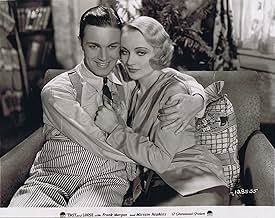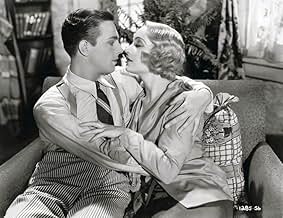A wealthy family is thrown into turmoil when the daughter falls for the family chauffeur and the son begins to keep company with a chorus girl.A wealthy family is thrown into turmoil when the daughter falls for the family chauffeur and the son begins to keep company with a chorus girl.A wealthy family is thrown into turmoil when the daughter falls for the family chauffeur and the son begins to keep company with a chorus girl.
Barry O'Moore
- George Grafton
- (as Herbert Yost)
Kirk Alyn
- Man Seated at Table in Speakeasy
- (uncredited)
Edward Keane
- Maitre d'
- (uncredited)
Featured reviews
Not the most original of plots, capricious heiress promised to a British lord falls for mechanic, while her equally spoiled heavy-drinking brother wants to marry a chorus girl. While the ending is no big surprise, the way to reach it is rather more original, as the pleasant and unhurried script finally reaches the more exciting climax it has been preparing. Good acting wins the day, though admirers of Miriam Hopkins will feel more satisfied than those of Carole Lombard, who inherits the fairly small and not so endearing part of the serious chorus girl with admirably strong morals. Still this is very much a pre-code movie, as can be seen in the night beach scene when the heiress and the rather uptight mechanic wonder whether they are both thinking about the same thing as Adam and Eve in the garden of Eden - and conclude it would be more advisable for them to go swimming...
Considering that this was adapted from a play (by nailing a camera to the end of the stage), you'd think the characters would have been more rounded. Shallow one-dimensional characters and a tiresome cliched story isn't the best combination for an entertaining movie.
The most disappointing aspect of this picture is that it doesn't convey any of the atmosphere you often get in a film from 1930. Maybe that's because of its stagey origin or maybe it's because it's based on a stuffy play from the early twenties? The plot has been done a million times and usually done a lot better than this. The acting is fine - not naturalistic but ok for 1930. Miriam Hopkins, in her first talkie is the most impressive and almost believable but the rest are just a bunch of actors reading lines from a script they've seemingly just been handed. It's not their fault but they're just poorly written parts.
We have stock stereotypes: stuffy, entitled and snobbish parents, spoilt, entitled and irresponsible youngsters and pure as the driven snow salt of the earth types. It's one of those lazily written films where the rich are all horrible and the poor are perfect. Not perhaps an obvious theme from Paramount considering their typical audience demographic but the rich eventually and predictably become unfeasibly lovey, lovely people so that willing appease their consciences.
I've seen worse but I'll not be searching out any more films from Fred Newmayer.
The most disappointing aspect of this picture is that it doesn't convey any of the atmosphere you often get in a film from 1930. Maybe that's because of its stagey origin or maybe it's because it's based on a stuffy play from the early twenties? The plot has been done a million times and usually done a lot better than this. The acting is fine - not naturalistic but ok for 1930. Miriam Hopkins, in her first talkie is the most impressive and almost believable but the rest are just a bunch of actors reading lines from a script they've seemingly just been handed. It's not their fault but they're just poorly written parts.
We have stock stereotypes: stuffy, entitled and snobbish parents, spoilt, entitled and irresponsible youngsters and pure as the driven snow salt of the earth types. It's one of those lazily written films where the rich are all horrible and the poor are perfect. Not perhaps an obvious theme from Paramount considering their typical audience demographic but the rich eventually and predictably become unfeasibly lovey, lovely people so that willing appease their consciences.
I've seen worse but I'll not be searching out any more films from Fred Newmayer.
This, the second cinematic version of THE BEST PEOPLE, a play by Avery Hopwood and David Gray that was first staged in 1924 and filmed in 1925, is a period piece that glides over the best efforts of time, its serio-comic point of view intact, a smartly paced affair presenting a strong opportunity for role development beneath its frothy Roaring Twenties backdrop. Paramount casts new contractee Miriam Hopkins for her film debut as wealthy Marian Lenox, along with Charles Starrett as her chauffeur and beau, Carole Lombard ( the "e" was added by a title scribbler for this film), Frank Morgan and whimsical Ilka Chase, all in top form, whilst Preston Sturges reconditions an already witty storyline. The setting is Long Island, where the Lenox clan resides, and where agitation reigns due to prospects of the family's adult son and daughter marrying below their station (to a chauffeur and a chorus girl), culminating with the entire family unintentionally meeting at a roadhouse speakeasy, whereupon a police raid adds to the growing embarrassment and consternation for two generations of Lenox family members. The film is smartly directed, and acted with verve by all cast members, Hopkins a lively delight and reliable Morgan as solid as ever, although it is Broadway standout Chase who steals acting honours with her uninhibited performance, each benefiting from the pungent dialogue of Sturges that maintains an airy tone for a sophisticated romp, this version topping its silent screen predecessor in all elements except for Warner Baxter's memorable playing of the prideful and lovelorn chauffeur.
Nothing pleased Depression Era audiences more than when working class people like chauffeurs and chorus girls got to date the rich sons and daughters of those with lots of money to waste. 99% of the audience fantasized it would be them as the rich son or daughter's new companion, because 99% of them were poor. Of course, they had no such change in real life. But for an hour or so, they could at least dream. I will take Carole Lombard over Miriam Hopkins for overall effect. The plot of the film is pretty original; as original as a copying machine. Don't bother watching this turkey unless you want to see an early Lombard performance.
In the midst of the Great Depression films often focused on the antics of the idle rich, with the best of these being made at Paramount. This film is about a wealthy family that is thrown into chaos when the son wants to marry a chorus girl (Carole Lombard) and the daughter (Miriam Hopkins) wants to marry a mechanic (Charles Starrett). Even though Carole Lombard is second billed in this film, she is practically a statue here -beautiful to look at, but having only a line here and there. This is really Miriam Hopkin's film as Marion Lenox, and she does a great job as the poor little rich girl that doesn't know what she wants until she meets the man of her dreams that turns out to be the family's newly hired mechanic. Frank Morgan plays his part as the father, Bronson Lenox, with all the befuddled flair we've come to expect from him. The whole film comes to a head when Bronson and his brother meet the chorus girl fiancée of Bronson's son at a roadhouse intending to convince the chorus girl to leave his son alone. Unfortunately Bronson's son shows up at the same roadhouse that night as well as Bronson's daughter with the mechanic in tow. There is a big scene between all involved that is only interrupted by a raid on the establishment.
Ilke Chase, as Carole Lombard's close friend and fellow chorus girl, is a great comic touch. The story calls for Carole's character to be sober and responsible, so Ilke is added as a counter to all of that. She physically resembles 30's Warner character actor Aline McMahon, but she has the wildness of all of the Gold Diggers of 1933 rolled into one with Winnie Lightner thrown in for good measure. Her vamping of Bronson Lenox's emotionally embalmed brother is hilarious.
One of the forerunners of the screwball comedies of the 1930's, ironically Miriam Hopkin's part here reminds me a bit of the part that Carole Lombard plays in 1936's "My Man Godfrey". Very entertaining and highly recommended if you run across this one.
Ilke Chase, as Carole Lombard's close friend and fellow chorus girl, is a great comic touch. The story calls for Carole's character to be sober and responsible, so Ilke is added as a counter to all of that. She physically resembles 30's Warner character actor Aline McMahon, but she has the wildness of all of the Gold Diggers of 1933 rolled into one with Winnie Lightner thrown in for good measure. Her vamping of Bronson Lenox's emotionally embalmed brother is hilarious.
One of the forerunners of the screwball comedies of the 1930's, ironically Miriam Hopkin's part here reminds me a bit of the part that Carole Lombard plays in 1936's "My Man Godfrey". Very entertaining and highly recommended if you run across this one.
Did you know
- TriviaOne of over 700 Paramount Productions, filmed between 1929 and 1949, which were sold to MCA/Universal in 1958 for television distribution, and have been owned and controlled by Universal ever since; its earliest documented telecast took place in Charlotte NC Saturday 14 November 1959 on WSOC (Channel 9).
- Quotes
Alice O'Neil: Oh, and before I forget. I think you're a big mug!
- ConnectionsVersion of The Best People (1925)
- How long is Fast and Loose?Powered by Alexa
Details
- Runtime
- 1h 10m(70 min)
- Color
Contribute to this page
Suggest an edit or add missing content































